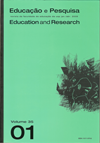Case method and case study: an epistemological approach
DOI:
https://doi.org/10.1590/S1517-97022009000100009Keywords:
Case Study, Case Method, Scientific Research, Academic formationAbstract
The present work seeks to draw a distinction between the concepts of Case Method and Case Study within the Social Sciences and their applicability, as well as to differentiate the empirical/inductive and theoretical/deductive modes of thinking, which are presented here as respectively characteristic of Americans and Germans, and as factors that distinguish the education in those two countries. To such end, the text describes the moment when the Case Method appeared in the Harvard Law School, emphasizing the social, economic, and cultural contexts that allowed the creation of this pedagogical instrument. At the same time, it shows the Case Study which, proposed by Yin, and whose work was referenced in that study, turned out to be one of the most often used methods in scientific works, challenging the belief that it is an easy-to-use method; actually, it requires from the researcher dedication and scientific rigor, apart from a formulation of the problem that avoids to make it obvious, a plain report of an experience. On the other hand, the Case Method created by Christopher Columbus Langdell does not go after empirical research as an answer to a given problem, but is a pedagogical tool employed in the training of lawyers, jurists and business administrators, in which theory is but an input for the analysis of jurisprudence and management experiences, and not just the pure and simple objective of academia.Downloads
Download data is not yet available.
Downloads
Published
2009-04-01
Issue
Section
Articles
License
Authors assume exclusive responsibility for the concepts expressed in their articles, which do not necessarily reflect the journal’s opinion.
Permission to photocopy all or part of the material published in the journal is granted provided that the original source of publication be assigned.
How to Cite
Case method and case study: an epistemological approach . (2009). Educação E Pesquisa, 35(1), 129-143. https://doi.org/10.1590/S1517-97022009000100009



